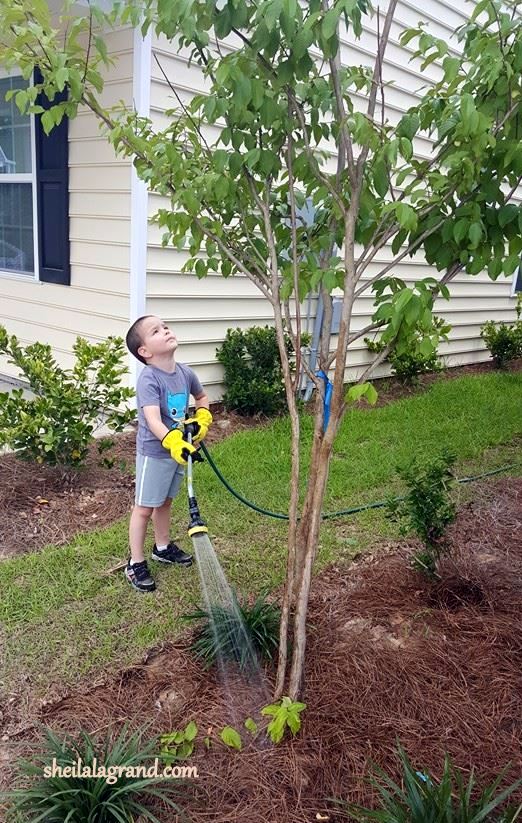 Sawyer, In Daddy’s Gloves, Watering and Watching (photo by Sawyer’s Mommy).
Sawyer, In Daddy’s Gloves, Watering and Watching (photo by Sawyer’s Mommy).
When I was five years old, I ironed my father’s cotton handkerchiefs for a penny per handkerchief. (If those wages seem exploitative, remember that at the time, a candy bar cost a dime.) I grew up in an era where household chores were everyone’s duty and cash incentives were optional. All my friends had chores to do: if I asked Joey to ride bikes with me and he said I’ve got chores, I knew he meant I can’t.
Since money and work consistently top the list of argument fodder for couples, we shouldn’t be stunned to hear that these topics can be tricky across generations, as well. After all, the range of defensible positions is broad. Consider this list:
Children should be paid for chores so they learn the value of working.
Children should perform chores so they learn about responsibility to the family: everyone contributes.
I’d like to ask my kids to help, but our schedules are packed and it takes three times as long to finish anything if they “help” me.
Our kids have to do chores, but they get to choose which ones.
We assign chores as discipline.
Kids should be free to be kids. They’ll have to work soon enough.
Our children do the housework and cooking. We’re both at work all day.
Our kids help out during the summer recess. During the school year, we want them focused on their studies and school activities.
My children do work at home and they volunteer at our church/library/community garden.
Despite this broad range of reasonable positions, differences of opinion about chores for children can be particularly caustic.
And I have a hunch that the causticity isn’t really about chores. So often our differences about x are really an idiom: it sounds like we’re talking about folding the towels, but we’re really code-talking about our fear/worry/dislike of y and z. I’m not a licensed psychologist, but I don’t think we need a psychologist to figure this out.
Might I propose a few stipulations that could help to ease tensions surrounding what we expect of the children? In fact, I think these particular stipulations might apply across many arenas. Ready? Here they are:
Grandparents: when your children choose a different model for managing kids and chores, it is not a referendum on how you reared them. Honest.
Parents: When the kids are visiting Grandma’s house, let Grandma decide what chores to assign. Unless your children are being asked to do something that you feel is unsafe, let it go. Even really young children can understand that different households have different rules.
Have a story to share about kids and chores? Tell us in the comments section.
Blessed is everyone who fears the Lord,
who walks in his ways!
2 You shall eat the fruit of the labor of your hands;
you shall be blessed, and it shall be well with you.
Psalm 128:1-2 (ESV)
Please join us. Be a part of the conversation.
You still have time to help me with research for my next book! Take a survey and help me tell a better story. Thanks!





Leave a Comment